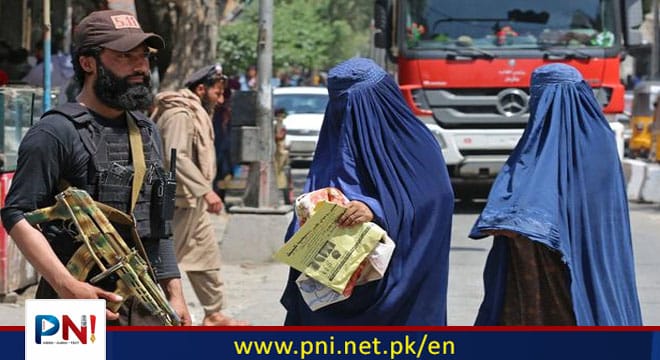UNITED NATIONS, Dec 15 (APP): Under Taliban rule in Afghanistan, women reporting gender-based violence to the authorities may end up in prison – supposedly for the victims’ own protection, according to a new UN report. That’s just one of the surprising findings of the report by the UN Assistance Mission in Afghanistan (UNAMA), which found that instead of filing a formal complaint, many survivors prefer seeking redress through “traditional dispute resolution mechanisms” within the community for fear of the de facto authorities – including “fear of revictimization”.
Before the Taliban seized power in 2021, there were 23 state-sponsored women protection centers in Afghanistan where survivors of gender-based violence could seek refuge. Now there are none, the U.N. report said. The report said that the plight of victims is compounded by the handling of gender-based violence complaints predominantly by male police and justice personnel. Since their return to power in August 2021 the Taliban have almost completely erased women from public life and civil service positions in the country, it was pointed out. Mechanisms and policies enabling victims to obtain legal redress and protection have “all but disappeared” since the Taliban takeover, the report notes. Some 23 state-sponsored women’s shelters were dismantled as women survivors needed instead to be with their husbands or other male family members, Taliban officials were quoted as saying. Being sent to prison allegedly for their own safety, was the only alternative, deemed some officials.
UNAMA noted that imprisoning women to ensure their protection from gender-based violence “would amount to an arbitrary deprivation of liberty” with dire consequences for their mental and physical health. The UN assistance mission reiterated the Taliban authorities’ obligation to ensure justice in gender-based violence cases, to put an end to “the perpetual culture of impunity” and also to provide protection and access to services for victims. Meanwhile, the UN Children’s Fund UNICEF, protection needs for children in emergencies from Ukraine to Gaza and Sudan have never been greater but the humanitarian funding forecast for 2024 is “increasingly bleak”. That’s the message from UNICEF, whose Deputy Executive Director for Humanitarian Action and Supply Operations, Ted Chaiban, said that flexible funding for aid is shrinking. At the same time, attacks against humanitarian actors around the world have surged. “Children should not be paying the price of our inaction with their lives and their futures”,
Mr. Chaiban said, stressing that youngsters need continued access to essential services including healthcare, safe water, basic sanitation and education. Earlier this week UNICEF launched a $9.3 billion emergency funding appeal to reach close to 94 million children in 155 countries in 2024. Chaiban said that this year’s ask was only about 50 per cent met and listed a number of “critically underfunded emergencies”. These include Sudan, Burkina Faso, the Democratic Republic of the Congo (DRC) Myanmar, Haiti, Ethiopia, Yemen, Somalia, South Sudan and Bangladesh. A lack of resources means that “choices will need to be made” regarding several essential interventions including immunisation, primary healthcare, treatment against severe acute malnutrition, and psychosocial support. Also in jeopardy are the means of addressing grave violations against children such as recruitment by armed groups, and basic education which is also “a life-saving intervention in emergencies”, UNICEF said.
Follow the PNI Facebook page for the latest news and updates.








